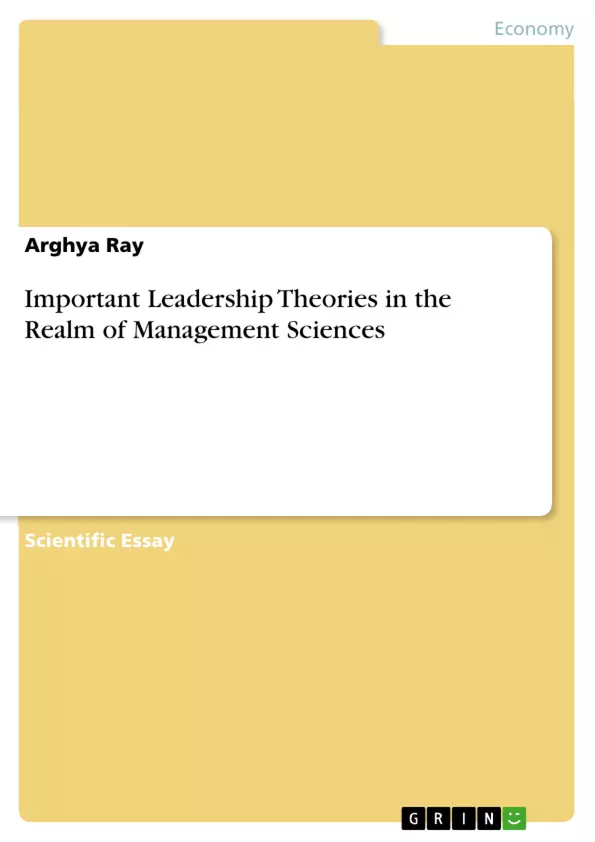This paper is aimed at providing the students of management with a holistic view of modern leadership research in the field of management sciences. It introduces the students to the basic understanding of leadership in a general way. Next, leadership in relation to business economics, organization and governance is explained. Then, we discuss on different categories of leadership theories. These are: Great Man Theories, Trait Theories, Contingency Theories, Management Theories (with special reference to Transactional Leadership Theory), Relationship Theories (with special reference to Transformational Leadership Theory, Situational Theories, Participative Theories (with special reference to Path-Goal Theory), Behavioral Theories (with special reference to Managerial Grid Model) and Leadership Member Exchange Theory. The individual theories, which are especially important and have attention from the academicians, have been separately mentioned under their respective categories. The paper ends with a suitable conclusion and an authentic reference list.
Table of Contents
- Abstract
- Introduction
- What is Leadership all about?
- Great Man Theories
- Trait Theories
- Contingency Theories
- Management Theories
- Transactional Leadership
- Relationship Theories
- Transformational Leadership Theory
- Special Note
- Situational Theories
- Participative Theories
- Path-Goal Theory
- Behavioral Theories
- Managerial Grid Model
- Leadership Member Exchange Theory
- Conclusion
- References
Objectives and Key Themes
This paper aims to provide management students with a comprehensive overview of modern leadership research in the field of management sciences. It introduces basic leadership concepts and explores various leadership theories in the context of business economics, organization, and governance. Key themes include:- The evolution of leadership theory from ancient times to the modern era
- Different categories of leadership theories, including Great Man Theories, Trait Theories, Contingency Theories, and Management Theories
- The importance of performance-oriented leadership in modern business economics
- The relationship between leadership and follower behavior
- The role of leadership in shaping organizational culture and environment
Chapter Summaries
The paper begins with a concise introduction to the concept of leadership, its historical evolution, and its relevance to modern business economics. The chapter on Great Man Theories explores the belief that leaders are born with inherent talents and that their lineage plays a significant role. This approach is contrasted with modern leadership theories that emphasize the importance of acquired skills and experience. The next chapter focuses on Trait Theories, which attempt to identify specific behavioral or personality features common to successful leaders. This chapter highlights the importance of understanding individual differences and how they relate to leadership effectiveness. The following section delves into Contingency Theories, which emphasize the importance of situational factors in determining leadership effectiveness. This chapter explores the idea that different situations require different leadership styles and that there is no one-size-fits-all approach to leadership. The paper then examines Management Theories, focusing on Transactional Leadership, which emphasizes the exchange relationship between leaders and followers. This chapter explores how transactional leadership styles can be effective in achieving organizational goals through motivation and reward systems. Finally, the paper delves into Relationship Theories, specifically examining Transformational Leadership Theory, which emphasizes the importance of inspiring and motivating followers to achieve shared goals. This chapter explores the role of vision, inspiration, and empowerment in leadership effectiveness.Keywords
This paper explores key concepts in leadership theory, examining the various categories and theories of leadership in the context of business economics and organizational management. Key terms include leadership, leadership theory, Great Man Theories, Trait Theories, Contingency Theories, Management Theories, Transactional Leadership, Relationship Theories, Transformational Leadership Theory, Situational Theories, Participative Theories, Path-Goal Theory, Behavioral Theories, Managerial Grid Model, and Leadership Member Exchange Theory.Frequently Asked Questions
What are the main categories of leadership theories?
Common categories include Great Man Theories, Trait Theories, Contingency Theories, Management (Transactional), and Relationship (Transformational) Theories.
What is the "Great Man Theory"?
It is the belief that leaders are born with inherent talents and that great leaders arise when there is a great need.
How does Transformational Leadership differ from Transactional Leadership?
Transactional leadership focuses on rewards and exchanges, while transformational leadership inspires followers to achieve shared visions and personal growth.
What is the Path-Goal Theory?
It is a participative leadership theory that focuses on how leaders motivate followers to achieve designated goals by clearing paths to success.
What is the Managerial Grid Model?
A behavioral leadership model that identifies different leadership styles based on their concern for people versus their concern for production.
- Quote paper
- Arghya Ray (Author), 2012, Important Leadership Theories in the Realm of Management Sciences, Munich, GRIN Verlag, https://www.grin.com/document/194720



